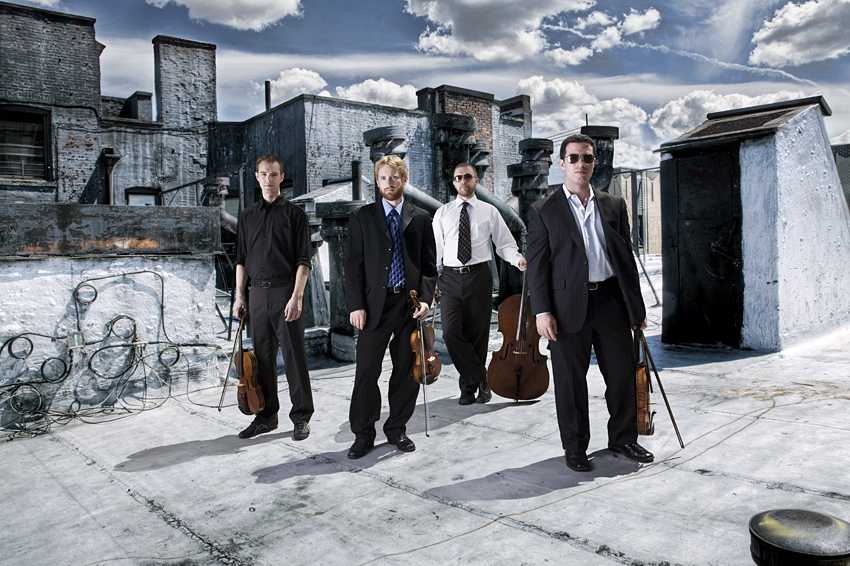JACK Quartet reveals the harsh beauty of Lachenmann’s music

The JACK Quartet performed the complete quartets of Helmut Lachenmann Wednesday at the Morgan Library. Photo: Justin Bernhaut
Even for those listeners who seek out new and contemporary music, the sound and aesthetic of Helmut Lachenmann’s three string quartets pose a real challenge. Their qualities are so exceptional that they seem to relate only tenuously to the often extreme context of cutting-edge contemporary music.
And so JACK Quartet’s performance of all three works Wednesday night at the Morgan Library, was that much more exceptional. They played the music with such intrinsic strength of conviction and such limber musicality that the incomprehensible became, if not completely soluble, then powerfully meaningful (the concert was in anticipation of the April 1 release of their CD of the complete Lachenmann quartets on the Mode label).
The most recent piece, String Quartet No. 3 “Grido,” from 2001, opened the concert. Before the first notes, violinist Ari Streisfeld addressed the substantial crowd. He related that the piece was the one with which they made their public debut, and that it had inaugurated a real friendship between the composer and his colleagues (violinist Christopher Otto, violist John Pickford Richards and cellist Kevin McFarland). Through the years Lachenmann had helped JACK find performing opportunities, and they had worked closely with him on his music (there was a lovely message from Lachenmann in the program notes, that read in part: “Once, they called me their ‘father,’ But when with them I feel fifty years younger, and they are my admired brothers.”).
Twelve years later, JACK has surpassed even the Kronos and Arditti quartets with their technical and interpretive skill in the most difficult new music. “Grido” sounded like the foundation to the group’s career that it is, completely assured in performance, played with technical, intellectual and expressive exactitude.
Lachenmann’s string quartets are profoundly difficult to play for two reasons: one is that they ask the musicians to make numerous strange, unpitched sounds with their instruments; the other is that the composer expects the musicians to understand why they are playing those sounds, and placing them with care in time and space, rather than notes—JACK’s relatively slow tempos and assured acceptance of silence were tremendously effective.
“Grido” is the closest of the pieces to even the modern avant-garde tradition, opening and closing with a series of silvery sustained notes—though nothing that adds up to melody or even much in the way harmony—and peppered with clearly shaped phrases.
Much of it is space, much of it is quiet, and much of it is scraping, slapping, snapping. There are haunting and amazing sounds, like softly whooshing tones that sound like the production of flangers and phasers, moments where the instruments seem to be breathing, even articulating vowels. Lachenmann’s first quartet, Gran Torso, written in 1971 and revised in 1989, was held together through the first third by the harsh sound of Otto twisting the hair of his bow against the side of his violin over and over again.
The sounds are more like electronic music, and their structure is more like musique concrète. One hears them as timbres arranged in time and space, rather than as some kind of harmonic structure. They accumulate in place, rather than merely marking the passing of time.
Gran Torso is extreme avant-garde music. The piece tries, as Otto remarked after the concert, to “make sounds that are ugly.” They are ugly, but the curious ear acclimates quickly, and what one soon hears is that the sounds are also deliberate, careful, meaningful. They respond to each other and express things. In Lachenmann’s words, that is “art as a foretaste of freedom in an age without freedom.”
There is some sense of the maddening frustration of that circumstance in the music, and there is a subtle but clear connection between these pieces and the late Shostakovich string quartets, with their hollowed out emotions and exhausted intellect, the tapping, tapping like fate knocking on a coffin. There is also an apocalyptic strain, an aesthetic that combines the films of Tarkovsky with the abandoned spaces of Chernobyl.
Phrases in the music repeat, but there’s no real rhythms. The effect is like the sound of dilapidated, untended machinery, sputtering into action, then seizing up. There is a prickling sensation at the back of the neck of wind whistling through empty, windowless buildings, especially in the extended and absorbingly beautiful flautando stretches in String Quartet No. 2, “Reigen seliger Geister,” dated 1989. Long stretches in the two earlier pieces are so quiet as to be at the threshold of audibility. The music can be heard as the sound of the world falling apart.
But Lachenmann is organizing events, and the music is making something out of nothing. These pieces may not please everyone, but they are made with purpose and exceptional skill. What is most important about this unique concert is that JACK played them with the seriousness they demand, and the conviction that every moment held meaning. Every sound was made with rare musicality, which provided its own singular beauty.
The Scharoun Ensemble performs at the Morgan Library March 12. themorgan.org



